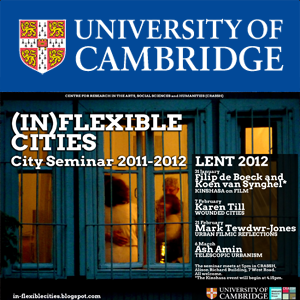City Seminar - 25 February 2014 - Informal Urban Citizenship in Buenos Aires: Migration, Informality and Visions for a just City
Duration: 48 mins 23 secs
Share this media item:
Embed this media item:
Embed this media item:
About this item

| Description: |
Tanja Bastia (University of Manchester)
In a number of cities in the Global South, cross-border migrants have played a major role in shaping the urban landscape. This is definitely the case in Argentina, where Bolivian and Paraguayan migration have become increasingly visible over the last few decades (Grimson 2006) and have been directly linked to increasing informality, whether at work or in housing. However, as with most studies of migration, most research to date is influenced by methodological nationalism, and fails to take into account the relationship between migration and space, either in terms of how the particularities of locales shape migrants’ experiences, or the multiple ways in which migrants contribute to the making of these places (Glick Schiller and Çaglar 2009). In this paper we report on preliminary findings from a pilot project carried out in informal settlements in Buenos Aires. The project focuses on place-based political organising by migrants and non-migrants alike in three informal neighbourhoods and includes interviews with grassroots organisations and city authorities. On the basis of the varied and multiple claims made through largely informal political organising around issues of ethnic identity, religion, work or housing, we explore how these claims might contribute to the construction of different visions of the city. Given that visions of cities are the basis on which cities develop, in this paper we explore some of these visions, particularly those put forward by migrant and mixed place-based organisations in urban informal settlements. The driving questions this paper seeks to address therefore include: What visions of justice do place-based organisations articulate in their strategies? Whose needs and interests do place-based organisations in neighbourhoods with high levels of cross-border migrants represent? How do city authorities perceive these different organisations? |
|---|
| Created: | 2014-02-28 09:39 |
|---|---|
| Collection: | City Seminar |
| Publisher: | University of Cambridge |
| Copyright: | Glenn Jobson |
| Language: | eng (English) |
| Distribution: |
World
|
| Keywords: | CRASSH; City Seminar; |
| Explicit content: | No |
| Abstract: | Tanja Bastia (University of Manchester)
In a number of cities in the Global South, cross-border migrants have played a major role in shaping the urban landscape. This is definitely the case in Argentina, where Bolivian and Paraguayan migration have become increasingly visible over the last few decades (Grimson 2006) and have been directly linked to increasing informality, whether at work or in housing. However, as with most studies of migration, most research to date is influenced by methodological nationalism, and fails to take into account the relationship between migration and space, either in terms of how the particularities of locales shape migrants’ experiences, or the multiple ways in which migrants contribute to the making of these places (Glick Schiller and Çaglar 2009). In this paper we report on preliminary findings from a pilot project carried out in informal settlements in Buenos Aires. The project focuses on place-based political organising by migrants and non-migrants alike in three informal neighbourhoods and includes interviews with grassroots organisations and city authorities. On the basis of the varied and multiple claims made through largely informal political organising around issues of ethnic identity, religion, work or housing, we explore how these claims might contribute to the construction of different visions of the city. Given that visions of cities are the basis on which cities develop, in this paper we explore some of these visions, particularly those put forward by migrant and mixed place-based organisations in urban informal settlements. The driving questions this paper seeks to address therefore include: What visions of justice do place-based organisations articulate in their strategies? Whose needs and interests do place-based organisations in neighbourhoods with high levels of cross-border migrants represent? How do city authorities perceive these different organisations? |
|---|---|

